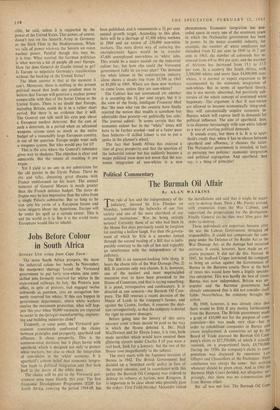Jobs Before Colour in South Africa
STANLEY UYS wiiies from Cape Town:
The more South Africa prospers, the more the industrial colour bar bends. In November, the manpower shortage forced the Verwoerd government to put forty non-whites into semi- skilled jobs formerly reserved for whites in the 'state-owned railways. In July, the Pretoria post office, in spite of protests, had engaged twelve coloureds as postmen, also an occupation for- merly reserved for whites. If this can happen in government departments, where white workers receive the maximum protection, What will hap- pen this year when 50.000 vacancies are expected to occur in the (priv4te) manufacturing, engineer- ing and building industries alone?
Evidently, at some point, the Verwoerd gov- ernment consciously confronted the choice between principles and prosperity, apartheid and affluence. It chose prosperity. This is the common-sense decision, but it plays havoc with apartheid, which is designed not only to protect white workers, but also to check the integration of non-whites in the 'white' economy. It is apartheid's solemn belief that economic integra- tion leads to rfolitical integration and that both lead to•the doom of the white man.
The choice will be put to the Verwoerd gov- ernment even, more bluntly this year. The first Economic Developnient Programme (EDP for South Africa, covering the period 1964-69, has been published, and it recommends a 54 per cent annual growth target. According to this plan, there will be a shortage of 47,400 white workers in 1969 and an excess of 238,000 non-white workers. The most direct way of reducing this unemployment figure would be to transfer 47,400 unemployed non-whites to 'white' jobs. This would be a major assault on the industrial colour bar, but how else could the Verwoerd government fulfil its six-year plan? The demand for white labour in the construction industry alone shows a steady rise from 55,700 in 1963 to 81,000 in 1969. Where are these new workers to come from, unless they are non-whites?
The Cabinet has not announced yet whether it is accepting the 54 per cent target, but it is the view of the lively, intelligent Financial Mail that 'the men who run the country, have finally rejected the notion that wealth is somehow less admirable than poverty—or politically less safe.' The journal added: 'It seems certain that the economic colour bar in the "white" areas will have to be further eroded—and at a faster pace than hitherto—if skilled labour is not to put a spoke in the planner's wheel.'
The fact that South Africa has enjoyed a time of great prosperity and that the question of the industrial colour bar has suddenly become a major political issue does not mean that the eco- nomic integration of non-whites is a new
phenomenon. Economic integration has pro- ceded apace in every one of the seventeen years in which the Nationalist government has been in power. In the motor assembly industry, for example, the number of white employees has dwindled from 82 per cent in 1949 to 41.7 per cent in 1963; the number of coloureds has in- creased from 4.9 to 40.6 per cent; and the number of Africans has increased from 13.1 to 17.7 per cent. In a country like South Africa, with 3,500,000 whites and more than 14,000,000 non- whites, it is normal to expect expansion to be accompanied by the economic integration of non-whites. But in terms of apartheid theory, this is not merely abnormal, but positively sub- versive of the whole concept of continued white hegemony. The argument is that if non-whites are allowed to become economically integrated, they will automatically acquire economic in- fluence, which will express itself in demands for political influence. The aim of apartheid, thus, is to dispense increasingly with non-white labour as a way of averting political demands.
It sounds crazy, but there it is. It is to apar- theid's credit that, when it has to choose between apartheid and affluence, it chooses the latter. The Nationalist government is revealed, in fact, as pursuing two policies: economic integration and political segregation. And apartheid, they say, is a thing of principle!

































 Previous page
Previous page